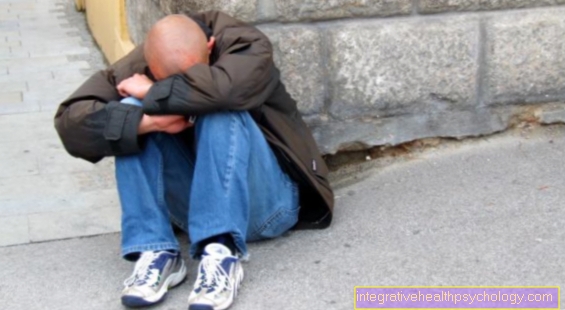mobbing
introduction
Bullying is behavior that involves children and adults at work or at school mentally and partly too physically bullied become. You could also call it psychological terror. However, not every bad word or teasing is bullying. Bullying is about regular severe humiliationswhich lasts for months. One speaks of direct bullying, if Victims verbally and physically attacked will and from indirect bullying, if Affected people isolated become.

Almost everyone knows bullying - either from oneself or from other people affected. Although this issue is well known, reactions are often relatively late and the perpetrators are often not punished for their actions. In many cases, especially among adults, the victims often do not dare to confide in others and ask for help. They usually meet with little understanding and are ashamed of being forced into the role of victim.
For many of those affected, bullying often begins very early, during elementary school or kindergarten. Heaviness Depression, eating disorders, severe weight loss, growth disorders, anxiety disorders and many more mental illnesses can be the result. Many victims of bullying need intensive psychological therapy in order to recover from the consequences. Sometimes an inpatient stay in a psychiatric ward in a hospital is necessary.
It is also possible that the Victims become perpetrators themselves at some point. On the one hand to take revenge on those who caused them this suffering and on the other hand to strengthen their lack of self-confidence by exercising power over another person.
The causes of bullying can be many. Often the class community senses when there is a more mentally unstable person among them. It can also envy and resentment play a major role. Often, victims of bullying are also children who from poorer backgrounds originate or that are just slightly different. Many of these children are rather calm and introverted.
Bullying is possible in almost every area. Of the Workplace and the school are classic examples. But nowadays that also takes place Cyberbullying more and more over the Internet. Really stressful are of course those areas from which one cannot “break out” so easily.
Victim of bullying
In theory, almost anyone can be a victim of a bullying attack. Nevertheless, one stands out certain pattern when comparing victims of bullying. Many are more sensitive and sensitive than the people around them. They react more quickly to offensive situations and exude a certain fear and insecurity, which classmates or employees often notice quickly.
Most of the time, these people also differ optically from other people. Especially People with a disability often have to endure bullying. Problems with bullying also occur more frequently among members of ethnic minorities who speak a different language or whose social status differs from that of others. Unfortunately, the style of clothing, appearance in general and material possessions are often reasons for being bullied.
What types of bullying are there?
While there is no difference in the frequency of bullying between men and women, there is a difference in the way in which they bully the victims. Women and girls tend to marginalize or ignore those affected. So social isolation plays a big role.
Men or boys, on the other hand, are more likely to be violent and verbally abusive. As mentioned earlier, bullying does not always have to be violent. Often it is emotional injuries that are triggered by exclusion, telling untruths, mocking or whispering behind the back of the person concerned. The victims of bullying are often attacked directly with words or they are made fun of in public.
Sometimes those affected are just plainly ignored completely and no one reacts when they say something. This, too, can cause severe psychological damage in the long term.
Bullying can happen in many ways. The most obvious variant is physical, i.e. physical bullying, in which the victim is harassed or beaten, for example. You can see this behavior especially in children and young people at school. In adults, such behavior no longer leads to the desired effect, namely the attention of a certain audience.
Much more often, therefore, it is not physical, but verbal bullying, in which the victim is insulted and amused at his expense. This could be, for example, attacks on his appearance, his school or work performance or his social situation. These acts of bullying are perceived by many as a joke and the effects on the victim are underestimated.
As a rule, more people join the perpetrator than in the case of bullying through physical violence, since the negative effects on the victim are not so easy to overlook. Depending on where a person is being bullied, one can also differentiate between school, office and cyberbullying (online bullying). If the victim is harassed by his superior, the term "bossing" is used.
Bullying at work
Bullying in the workplace can take place at all levels.In bullying, however, one of the people is always the victim who is inferior to the other or the other person (s). This can be physical and / or psychological. It is particularly difficult when bullying among adults that the bullying victims usually do not dare to tell someone about the bullying because they feel “weak” and do not want to admit this weakness.
Unfortunately, those affected often cannot find a person who perceives the suffering accordingly and takes it seriously. The better managers in particular are trained in relation to bullying, the better one can counteract this problem. It would be important that an outside person can arbitrarily intervene, or that the person concerned has someone to whom they can confide. Many large companies even have bullying officers who are specially trained and can then intervene in an arbitrating and advisory manner.
It is important to pay attention to the welfare of the employees, to deal with conflicts openly and constructively and to work against conflicts from the outset in order to prevent bullying as much as possible.
Bullying in the workplace can range from social isolation to violence. Often the victim is systematically excluded during trips, breaks and meetings after work. Bullying can also include verbal attacks, for example if the person concerned is insulted. There is also the possibility of untruths being told about the person concerned, which of course can lead to social complications.
It is important to distinguish that a one-off argument or a bad word does not mean that someone is being bullied. Rather, bullying extends over a longer period of time and consists of different phases.
What can I do if the boss / supervisor is bullying?
Bullying by the boss puts those affected in a particularly difficult situation, as they cannot easily defend themselves for fear of losing their job. Often the colleagues are also part of the problem in that they offer the superior an audience or even actively participate in the harassment, so the person affected often lacks a contact person.
Nonetheless, the line manager makes himself liable to prosecution and can be held accountable. First, however, you should seek a conversation with the boss and address the problem in order to clear any misunderstandings out of the way.
The person concerned should also try to show a certain indifference and calm towards the boss and thus take away the fun of harassment. But if none of this is of any use, the person concerned has to turn to a higher authority, for example the staff council. It is helpful to be able to show evidence of the bullying, such as e-mails or testimony from witnesses.
Ultimately, the boss could even be reported, but such a legal dispute requires a lot of money and time. Nevertheless, legal processing can be advisable for reasons of compensation, among other things, if the person concerned suffers from health problems due to the bullying.
Bullying at school
Bullying doesn't stop at school or even elementary school. Social isolation often begins even during kindergarten and at the playground. Especially when children are exposed to enormous psychological stress at an early age, this can lead to considerable mental and physical disorders.
Often growth problems and severe weight loss are the result. In most cases, school performance also drops sharply. Even children often develop severe depression and anxiety disorders. Especially when it is no longer just isolation, but classmates are assaulted.
A classic sign of bullying is when a child complains of stomach aches and headaches that always come before they go to school. In this case, parents should pay attention.
Education about bullying is also very important in schools. Pupils and teachers should be familiar with the topic and identify and intervene as soon as possible. Unfortunately, the victims of bullying are mostly alone because many children are afraid of becoming victims themselves if they stand up for the children concerned. Unfortunately, this fear is very often confirmed. However, trust teachers or class teachers are very suitable as contacts. You can make a big difference in your lessons by educating the children.
If children are affected, it can help to seek advice from a child psychologist so that mental disorders can be counteracted as well as possible. If the bullying does not stop despite all efforts, it is advisable in extremely severe cases to get your child out of this environment and, for example, change schools.
Children who have a different social status than the rest of the class, have disabilities or speak a different language are particularly at risk of bullying. Often, highly intelligent children or introverted children are also affected.
Read more on the subject at: Bullying in primary school.
Social bullying
Social networks such as Facebook, Twitter, Instagram or Snapchat offer an optimal platform for so-called cyberbullying or cyberbullying, i.e. bullying over the Internet. The attacker, or "bully", uses these services to harass, insult or expose his victim by e.g. Leaving nasty comments on the victim's side, negatively editing pictures or uploading degrading videos.
The anonymity of the Internet makes it particularly easy for the perpetrator to terrorize others, which is why cyberbullying is becoming an ever greater problem. This form of bullying often affects the victim more than harassment at school or at work, as it can be attacked around the clock via the Internet and is therefore not even safe from it at home.
In addition, the attacker does not see the injured person's reaction and is not slowed down by it. The audience is also larger, as offensive content can be disseminated very quickly. Victims of cyberbullying attacks are still barely protected and perpetrators difficult to identify. The legal situation lags behind the development of the Internet in these matters.
What can be the long-term consequences of bullying?
The aim of bullying is to systematically exclude, humiliate and wear down the victim in order to look better as an individual or as a group. For the victim, this means constant attacks on self-esteem and total social isolation at the location of the bullying. The person becomes insecure and stressed, loses self-confidence and can eventually get really sick.
Typical symptoms of a bullied person include sleep and concentration problems, eating disorders, anxiety or physical complaints such as abdominal pain and headaches. In the long run, this can even lead to serious physical or mental illnesses, such as cardiovascular disorders or depression.
Many therefore suffer psychologically or physically from the consequences of bullying for years. For example, people who were bullied in childhood often find it much more difficult later in their working lives, suffer from social anxiety and are at an increased risk of depression.
In the worst case, the person can be put under such high emotional pressure that they eventually commit suicide.
What are typical accompanying symptoms of victims of bullying?
Bullying is an enormous burden for the victim, which at some point also affects life outside of the bullying situation, for example, manifests itself in various symptoms not only at work, but also in everyday life. Concentration disorders and performance losses, nervousness, sleep problems or reduced psychological resilience and even panic attacks are very typical.
The victims have physical problems such as indigestion and nausea, sweating, palpitations or dizziness. These symptoms then appear not only in connection with the bullying, but also in situations in which the person would otherwise feel comfortable. The psyche cannot process this burden so easily and thus affects all areas of daily life.
Bullying is therefore not only a problem at school or at work, but can make a person permanently ill. The symptoms mentioned can thus establish themselves and, in addition to psychological problems such as depression, also lead to diseases of the cardiovascular system, the immune system, the respiratory tract or the gastrointestinal tract.
What are the causes of bullying?
Bullying occurs in principle wherever people come together, such as at school, at work, in clubs or on the Internet. This type of dominance behavior therefore seems to be fundamentally anchored in our social life and, at least in its basic features, comes from the need for rank and hierarchy of people.
The reasons for bullying therefore usually lie in the aggressor's urge to assert himself, his personal conflicts and the social structures in which he finds himself, e.g. school or work. Typical positive stress factors in these environments are, for example, a high workload, a bad working atmosphere, hierarchical structures or unclear roles or tasks, and the resulting excessive demands. Dominant characters like to let this stress out on their fellow human beings, reluctant people are more likely to be the target of these attacks.
Is bullying a criminal offense?
Bullying as such is not listed in the penal code and is therefore not punishable. However, the individual acts in the context of bullying are very unlawful if they represent the facts such as coercion, defamation or insult. In addition, bullying can be considered as bodily harm if the victim becomes mentally or physically ill as a result of the harassment and this is certified by the doctor.
In Germany there is no uniform law against bullying, but there is one against individual acts of bullying. It can therefore be difficult in individual cases to assert legal claims if the individual facts first have to be proven.
This is a big problem especially with cyber bullying, i.e. bullying on the Internet. This includes, for example, the distribution of personal pictures or videos glorifying violence or mocking on social media such as Facebook. On the Internet, however, not only the individual criminal acts, but also the identity of the accused must be clarified.
If the offender is successfully convicted, whether online, at school or at work, he may face fines or even imprisonment of up to 3 years, depending on the offense.
Help with bullying
Although the subject of bullying in society is often still an issue Taboo subject there are more and more ways to seek help. Since it is very difficult to defend yourself against your tormentors on your own, you should Find allies. That means friends, family, acquaintances, teachers or superiors. Classmates or employees can also provide support. Otherwise, supervisors or teachers can do appropriate educational work and try to talk to the bullies.
Furthermore stand numerous self-help groups available where you can learn how to deal with bullying and that you are not alone. It is also recommended in Advisors or numerous Internet sites Seek help and advice. Of course there is also the option of one Therapy or a consultation from a psychologist / psychotherapist.
Is there a test for bullying?
Various websites offer the possibility of using questionnaires to identify observed behavior as bullying. However, there is no conclusive test, as bullying can happen in a wide variety of ways and such tests can only assess the subjective perspective of the person concerned.
If you have friends or colleagues at the site of the bullying who know the situation and can provide you with objective assessments when completing such a test, you will get a more meaningful result.





























